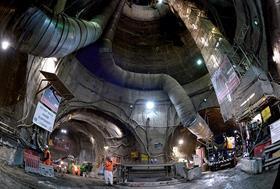Construction industry figures react to George Osborne’s eighth Budget

Industry leaders have welcomed Chancellor George Osborne’s commitments on housing and infrastructure in today’s Budget.
The chancellor announced £300m of transport funding, including support for High Speed 3 in the North and Crossrail 2 in London.
Osborne also laid out £4bn of spending cuts, and a £1.5bn plan to convert all state schools into academies by 2022.
Housing
Melanie Leech, chief executive of the British Property Federation, said: “Commercial property investment can often act as the catalyst for regional growth and as the economy has recovered investment has been spreading out from London to the UK’s regions, but will now undoubtedly slow. The real set back in today’s announcement is that development in places like the Northern Powerhouse and Midlands’ Engine will now be held back as a result of this out-of-the-blue raid on commercial property transactions.”
Elizabeth Bradley, head of the corporate tax team at international law firm Berwin Leighton Paisner, said: “Much of the British property industry will be very disappointed with today’s Budget changes. The property sector is effectively being used to placate the Government’s back benchers.
“The Chancellor has acknowledged the need to build more homes but the extension of the extra stamp duty rate on buy-to-let to large investors will discourage investment in the private rented sector. Overall, increased tax costs will not be offset by the reduction in corporation tax rates to 17% by 2020.”

Brian Berry, chief executive of the FMB, said:
“The Government has set itself a target of a million new homes by 2020. That is rightly ambitious, but the continuing gap between what’s being built and what needs to be built makes hitting that target more difficult by the day. Official statistics show that annual housing completions in England totalled just over 140,000 in 2015, a long way short of the 200,000 homes we need every year to hit one million.
“We are nearly 12 months into the current Parliament and the Government is already falling well behind on its targets. We recognise that the Government is working on a number of fronts to speed up the planning process and intervene to support first time buyers, and some of the measures in today’s Budget are welcome steps forward. Yet these announcements are limited in scope and won’t signal the step change that we need to see.”

Dave Sheridan, chief Executive of Keepmoat, said:
“Today, the Chancellor showed welcome support for our supply chain and the army of people looking to purchase their first home.
“The reform to business tax, reduction of business rates and corporation tax for small businesses will allow them to grow quicker and become more stable, which will only help the housing sector in the long term. The cut in capital gains tax may encourage landowners to sell their land to developers without fear of high tax rates, which could open up more opportunities for building much needed homes.”
Naomi Heaton, chief executive officer of London Central Portfolio, said: “Overall, the Budget was not bad news for individual property investors. There were none of the shocks that we have been accustomed to in previous Budget speeches.”
“For corporate investors, the application of the 3% ARSD was unexpected although there will be some sympathy that the playing field was levelled. In any event, many corporates will be unaffected if they are investing in entire buildings. However, there is a concern that the Chancellor is doing nothing to help develop our essential PRS sector which needs a minimum of 128,000 new units by 2021.”
Julian Goddard, partner and head of residential at Daniel Watney, said: “By continuing to squeeze private landlords with new regulations and taxes at a time of soaring rental demand, the government only risks exacerbating problems within the private rented sector.
“The growing burden placed on landlords may cause many to exit the market causing a crunch in supply and a spike in rents - the last thing renters need, especially in London.”
James Davis, partner and head of building consultancy at Daniel Watney, said: “While land supply and planning restrictions have played their part in holding back housing delivery, the shortage of skilled labour and key materials is another major obstacle and one the government has yet to fully address.”

Jane Duncan, president of RIBA, said: “Further devolution deals will be an ideal opportunity for architects to work with communities on housing, planning and transport issues that ensure we get more high quality affordable homes for everyone.
“But, there are too many unanswered questions about how the Government plans to address the housing crisis affecting every part of the country. Councils need to be given greater borrowing powers to invest in new housing. The continued focus on home ownership means that there are huge parts of the market where private developers and housing associations either can’t or won’t invest.”
Adam Challis, head of residential research at JLL, said: “New Stamp Duty changes will impact large investors without exemption. This is an extraordinary lost opportunity to support the growth of Build to Rent and undermines this nascent sector. Private renters have once again been overlooked.
“Garden suburbs are a more practical, deliverable approach to solving the UK’s housing crisis than the wholesale Garden City. The programme will need a lot of engagement with local communities if it is to be welcomed but could be a big step in the right direction.”
Infrastructure

Richard Steer, chairman of Gleeds Worldwide, said: “With growth forecasts revised downwards, once again the chancellor is looking at construction to literally dig both the country and him out of its problems. There were some good things for us if they come to fruition and spending on transport and infrastructure are positive for our industry but, as someone once said in a fit of desperation, “show me the money”.
“All too often these initiatives have been previously announced without real government funding behind them. HS3 for instance has been mentioned in 34 different speeches, sector specific comments or press releases by the government over the last two years. On the surface our industry should welcome announcements like the reduction in corporation tax, lowering of business rates, stamp duty reduction for commercial property and dropping Capital Gains tax rates but for me it is a bit like employing a finance director who has his eye on another job and keeps getting the sums wrong. It’s a budget with a number of unrealistic targets like the optimistic surplus prediction and it seems to me that it was more about politics than finance.”
Mark Cleverly, head of commercial developers at Arcadis, said: “Today’s budget announcements confirming investment into transport infrastructure represents good news for the UK’s commercial developers sector. A commitment to long term infrastructure investment will create renewed appetite for developers and investors in our regional towns and cities, where poor transport links have historically impeded economic growth, dragged down land values and discouraged development.
“These announcements are likely to encourage the delivery of employment hubs and housing volumes across the UK as developers and house builders become increasingly confident about the returns on offer outside London. These infrastructure investments could pave the way for a re-balancing of the Country and a 20 year renaissance in property development across the Midlands and the North.”
Mac Alghita, managing director for infrastructure at Arcadis, said: “It is encouraging to see that the budget allocated for transport promotes a holistic approach. It advocates that the long term wealth and prosperity of our major cities is directly linked to our ability to create economic infrastructure and transportation systems that connect these cities to each other and to the capital. It is clear that the recommendations of the National Infrastructure Commission have significantly influenced this budget.
“The Chancellor’s allocation for Crossrail ensures that the scheme remains alive, and provides the perfect opportunity for refinements over the next 12 months to improve the Benefit/Cost Ratio. For the scheme to progress towards construction it may be necessary for the new Mayor to attract more private funding to demonstrate that London is picking up the lions’ share of the cost.”

Patricia Moore, UK head of infrastructure for Turner & Townsend, said:
“We’re relieved at the Chancellor’s progressive steps to make infrastructure a priority, putting it firmly at the heart of fiscal planning for the long-term.
“Future spending on transport projects such as HS3, a new tunnel between Manchester and Sheffield, and upgrades to the M62 and main A66 and A69 roads, will all help stimulate and reinvigorate the economy in the North providing a much-needed boost to jobs and trade.
“But like any major spend on infrastructure, you need effective cost control mechanisms set up or you’ll burn through money. Major programmes need the skills, capacity and resources in place to deliver efficiently and each of these new transport programmes must guarantee the best value for money for taxpayer and client.”

Mark Robinson, chief executive of Scape Group, said:
“The Chancellor reaffirmed this government’s commitment to UK infrastructure, particularly the establishment of a Northern Powerhouse, but this comes alongside news of public spending cuts of £3.5 billion by the year 2019/2020.
“Further cuts might mean that local services the public take for granted, such as regular bin collections and well-maintained leisure centres and libraries, are chipped away at even further in order to protect the absolutely essential services. Ultimately it may mean the swathe of innovative new infrastructure discussed today cannot be adequately maintained for future generations.
“Mr Osborne has also put further weight behind the emerging Northern Powerhouse. The work of Lord Adonis and the National Infrastructure Commission is commendable but the Commission is still just 18 months old. My recent call for greater leadership of the Northern Powerhouse appears to have been answered through the elected ‘Northern Powerhouse mayors’ and this could be the extra driving force the Northern Powerhouse sorely needs.
Tony Kearns, operations director for rail at WSP | Parsons Brinckerhoff, said: “The Chancellor’s backing of HS3 and Crossrail 2 is fantastic news. This commitment to the project, alongside other major railway investments nationwide, gives the engineering sector the confidence to recruit in preparation and develop the skills the industry needs to deliver these ambitious schemes.”
Dr Diana Montgomery, chief executive of the Construction Products Association, said: “The Chancellor has rightfully recognised the value of infrastructure investment, both for the present and future generations’ benefit. The government’s support for the National Infrastructure Commission is encouraging and the list of projects given the green light such as HS3, Crossrail 2 and numerous other schemes across the country will please everyone in the construction supply chain.
“Still, we are very mindful that announcements are one thing but spades in the ground are another thing altogether. We therefore welcome the announcement of a National Infrastructure Delivery Plan which we hope will provide clear, short-term delivery details for major projects and give manufacturers and builders the confidence they need to invest in skills and manufacturing capacity.”

Alasdair Reisner, chief executive of CECA, said:
“We welcome today’s report, which should deliver the vital reform needed, while allowing existing programmes of work to continue.
“We are also pleased to see Shaw call for greater efforts to plan skills for the sector. This was another area where our members wanted a better approach, and we look forward to working with other industry stakeholders to achieve this, following the Government’s response to the report later this year.”
Energy
Melanie Leech, chief executive of the British Property Federation, said: “It is very welcome to see a confirmed move towards a simpler kind of energy taxation system, and one that represents a more direct incentive at building level for the owner and the occupier to collaborate on improving energy and carbon performance, and a welcome reduction in accompanying administrative burden.”

David Symons, environmental director of WSP | Parsons Brinckerhoff, said:
“Simplifying energy taxes is welcome – abolishing CRC helps business cut bureaucracy and energy use at the same time. CRC lost much of its interest to senior managers once the revenue recycling elements of the scheme was removed. Abolishing it is the right thing to do, although the only surprise is that it’s still around until 2019.
“We were never expecting green-friendly policies to dominate - but seeing so little so soon after the Paris agreement still feels like a missed opportunity. Once again, this Budget shows it’s difficult to balance climate leadership, protect UK oil and gas jobs, and eliminate the deficit.”
Small businesses
David Parker, head of business rates at Savills, said: “Whilst the concessions to small businesses announced today are welcome, there needs to be clarity from the Government as to whether the Business Rates system is to remain ‘fiscally neutral’ as the concern will now be how these giveaways will be funded.
“If the system is to remain ‘fiscally neutral’ the money will presumably come from a sharp increase in the supplement introduced to fund small business relief, which is now to be applied to properties with assessments above £51,000 rateable value and is not constructive for the economy going forwards. The ‘small business supplement’ has risen from 0.7p to 1.3p over the past 10 years. A further sharp increase will result in greater inflation busting increases for many of Britain’s businesses.”
Tim Beattie, head of rating at JLL, said: “Although it has been a long time coming, it’s very welcome news that 600,000 small businesses will be released from the business rates burden. Linking the rate measurement to CPI as opposed to RPI is something that retailers and businesses have been clamouring for for years and while this is positive news, it seems a little odd that it is being introduced in 2020 when there is no reason why it can’t be implemented now.
“The Chancellor said that he wants to make tax simpler, but the new bureaucratic business rates appeal system known as Check Challenge Appeal runs contrary to this. It was the government’s stated aim in today’s Budget to simplify business taxation and given that the Chancellor estimates that 600,000 businesses will not be paying rates, surely the system is a ripe contender for simplification.”



























No comments yet